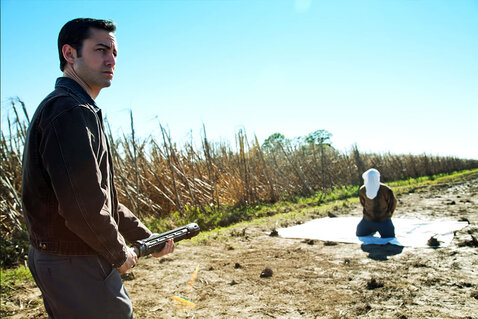B+ | Futuristic organized crime uses time travel to send the condemned into the past to be killed and disposed of. One of the condemned is set to be murdered by his past self. Directed by Rian Johnson Starring Joseph Gordon-Levitt, Bruce Willis, and Emily Blunt Review by Jon Kissel |

Of the two classic time travel questions that Looper asks, ‘what if you met yourself thirty years in the future’ comes first. Johnson isn’t immune to pathos and earnestness in his films but he is allergic to sap. When they meet under calmer circumstances, Young Joe and Old Joe have nothing to say to each other. There’s no wisdom offered, no awe at their scenario. Old Joe hates the version of himself that was an aimless, high-functioning drug abuser, and because that’s who Young Joe is, he has no interest in being told what to do by anyone. They’re operating at total cross purposes, with each screwing up the other’s life. This is such an ingenious way to imagine this kind of story, yet it feels exactly right once it’s proposed to the viewer.
The other classic question is would you kill baby Hitler? The question relies on the certainty that history would proceed in the same way if baby Hitler survived, but Johnson takes a different approach. This is hinted at in the first half of the film, with Seth’s torture and with Abe talking about how he changed Joe’s life path from dead-end street rat into well-heeled criminal. Does the terrible thing have to be done to fend off a bad end? Is the bad end inevitable without intervention? Looper’s baby Hitler is young Cid (Pierce Gagnon), a psychically powerful kid with some accidental murders on his belt. Isolated on a farm with his mother Sara (Emily Blunt), Cid will grow up to be the Rainmaker, a shadowy crime boss who’s sending all the old loopers back to the past to die. If Old Joe can kill him, his wife in the future won’t be killed when the Rainmaker’s men come for Old Joe. It’s such an out-there proposition that it seems dismissable. Kill this child to save your wife. Except Looper prompts one to consider all the times these mental exercises are executed in the past and the present, where war and brutality is premised on the enemy coming for you if you don’t get to them first. Imagining civilians lined up in a ditch and their murderers pulling the trigger with love in their hearts is unconscionable but a historical certainty. Looper takes the viewer right there with Old Joe killing a kid he thinks might be the Rainmaker, and making the decision that her life is more valuable than this child on his way home from school. A stylish sci-fi flick is not where one expects to plumb the depths of human behavior.
Willis sells this moment and several others in the last film where he would be an engaged actor. A critique exists where if Old Joe is going to kill up to three kids to save his wife, the viewer should have more of a sense of the wife herself. This persists in spite of Willis’ credible investment in their relationship, and it’s the biggest thing I think the film is missing. Regarding the rest of the cast, Gordon-Levitt is reliable under Willis-impersonating makeup, striking strong action flick poses while being outclassed by his castmates. Looper transitioned Blunt from costume dramas into action and sci-fi. All she really does is chop away at a stump, but it was enough to get her Edge of Tomorrow. She moves quickly with Young Joe, but it’s credible based on her reckless past, and her maternal chemistry with Gagnon is vital to the film packing any emotional wallop. Gagnon is expressive for how young he is, and looks like he could age into a dominating psychopath. It’s always great to see Garrett Dillahunt, doubly so when he once again gets to memorably die, and Jeff Daniels provides a reminder of how wasted he was during this period on The Newsroom.
The cast is all operating in service of Looper’s ideas which find a way to be appealingly humanist amidst the heightened premise. The world of the film is decayed and desperate, crawling with vagrants and their abandoned children, all of whom will take their deprivation and trauma into adult bodies with adult strength and will. A version of this film has Old Joe’s wife killed by random street crime, and he takes control of the time-travel machine to stop the murderer as a child but instead cleans the kid up. The wife lives without Old Joe, but he becomes a surrogate father and experiences a different kind of love. Taking care of each other becomes how to kill baby Hitler. It’s trite, but Johnson’s future films contain a bafflement that people can be as terrible as they are, like he’s shaking the shoulders of Ed Norton in Glass Onion and begging him to explain himself. Looper, amongst all of its other objectives, tries to find an answer to this question. Its ambition matches its achievement for a great film. A-
 RSS Feed
RSS Feed